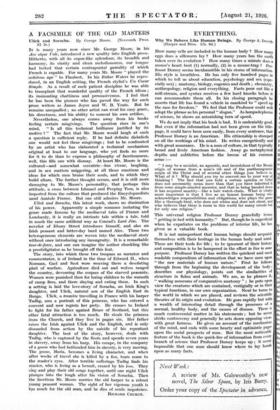EVERYTHING.
Why We Behave Like Human Beings. By George A. Dorsey, (Harper and Bros. 12s. 6d.) 1 a
How many cells are included in the human body ? How many eggs does a silkworm lay ? How many years has the earth taken over its evolution ? How many times a minute does a mouse's heart beat (1) normally, (2) in a mouse-trap ? Pro. fessor Dorsey seems inexhaustible in his stores of information. His style is breathless. He has only five hundred pages is which to tell us about education, psychology and sex (espe. cially sex) ; anatomy, biology, eugenics and death ; chemistry, anthropology, religion and everything. Facts pour out like a mill-stream, and syntax receives a few hard knocks before it can accommodate them all. In his closing paragraph he asserts that life has found a vehicle in mankind to "speed up the race for freedom." We feel that the Professor could well adopt the phrase as his personal" slogan." As lampadephorus of science, he shows an astonishing turn of speed.
We do not imply that his book is bad. It is undeniably good. But even if the information had not been given on the title. page, it could have been seen easily, from every sentence, that Professor Dorsey is an American. His citizenship is stamped on all the workings of his mind. He writes energetically and with great assurance. He is a man of culture, in that typically broad and lively American fashion. Away go metaphysical tl depths and subtleties before the breeze of his common 13 sense :—
"I may be a socialist, an agnostic, and incredulous of the Mosaic origin of woman from a man's rib and of the parthenogenetic origin of the Christ and of several other things you believe in. What of it ? Why should you try to convert, me to your way of thinking ? The fact that you hold a certain opinion or belief does not necessarily mean more than that you have inherited it from some simple-minded ancestor, and that in being handed down it has acquired sanctity—like a hair watch-chain. What is vitally more important is that I live as an honest human being who acknowledges responsibilities and obligations, who plays the game RI like a thorough-bred, who does not whine and does not cheat, and who believes that there is room in this world for many creeds but for only one religion."
This universal religion Professor Dorsey gracefully terms "getting in bed with humanity." But, though he is superficial when he expatiates on the problems of interior life, he has given us a valuable book.
It is not unimportant that human beings should acquaint themselves with their heritage in the human body and mind. These are their tools for life ; to be ignorant of their history and composition is to be hampered in the effort to live to some purpose. Professor Dorsey has written the quickest and most readable compendium of information that we have seen upon "the raw materials of human nature." First he follows through from the beginning the development of the body; describes our physiology, points out the similarities of structure in fishes and animals. We are, as he phrases it,
walking museums of comparative anatomy " ; he puts upon view the creatures which are contained, vestigially or in their typical functions, in our own organization. Next he turns to
the world in which we are placed, and reviews the scientific theories of its origin and evolution. He goes rapidly but with a wealth of interesting detail through the processes of a normal, healthy body, and the causes of disease. There is much controversial matter in his statements ; but he never shirks controversy and generally he sets down opposing view.' with great fairness. He gives an account of the mechanism of the mind, and ends with some hearty and optimistic Pages upon the social prospects of man. But the most noticeable feature of the book is the quick-fire of information from everY branch of science that Professor Dorsey keeps up ; it seenV
impossible that one man should know where to lay hands upon so many facts.
cc 4
'L
11


































 Previous page
Previous page